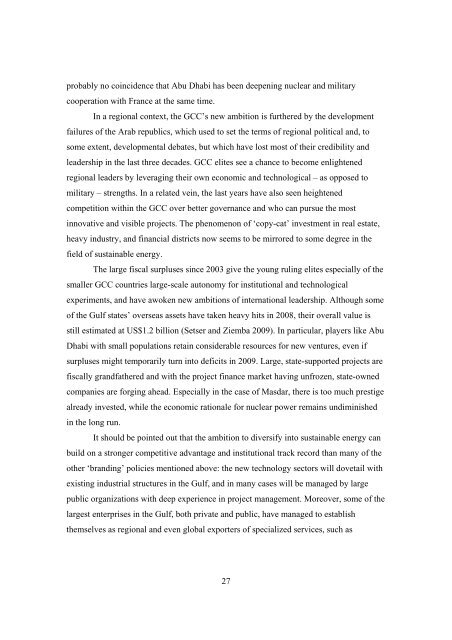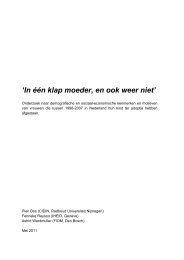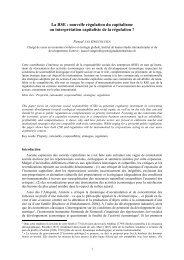PDF - Graduate Institute of International and Development Studies
PDF - Graduate Institute of International and Development Studies
PDF - Graduate Institute of International and Development Studies
You also want an ePaper? Increase the reach of your titles
YUMPU automatically turns print PDFs into web optimized ePapers that Google loves.
probably no coincidence that Abu Dhabi has been deepening nuclear <strong>and</strong> military<br />
cooperation with France at the same time.<br />
In a regional context, the GCC’s new ambition is furthered by the development<br />
failures <strong>of</strong> the Arab republics, which used to set the terms <strong>of</strong> regional political <strong>and</strong>, to<br />
some extent, developmental debates, but which have lost most <strong>of</strong> their credibility <strong>and</strong><br />
leadership in the last three decades. GCC elites see a chance to become enlightened<br />
regional leaders by leveraging their own economic <strong>and</strong> technological – as opposed to<br />
military – strengths. In a related vein, the last years have also seen heightened<br />
competition within the GCC over better governance <strong>and</strong> who can pursue the most<br />
innovative <strong>and</strong> visible projects. The phenomenon <strong>of</strong> ‘copy-cat’ investment in real estate,<br />
heavy industry, <strong>and</strong> financial districts now seems to be mirrored to some degree in the<br />
field <strong>of</strong> sustainable energy.<br />
The large fiscal surpluses since 2003 give the young ruling elites especially <strong>of</strong> the<br />
smaller GCC countries large-scale autonomy for institutional <strong>and</strong> technological<br />
experiments, <strong>and</strong> have awoken new ambitions <strong>of</strong> international leadership. Although some<br />
<strong>of</strong> the Gulf states’ overseas assets have taken heavy hits in 2008, their overall value is<br />
still estimated at US$1.2 billion (Setser <strong>and</strong> Ziemba 2009). In particular, players like Abu<br />
Dhabi with small populations retain considerable resources for new ventures, even if<br />
surpluses might temporarily turn into deficits in 2009. Large, state-supported projects are<br />
fiscally gr<strong>and</strong>fathered <strong>and</strong> with the project finance market having unfrozen, state-owned<br />
companies are forging ahead. Especially in the case <strong>of</strong> Masdar, there is too much prestige<br />
already invested, while the economic rationale for nuclear power remains undiminished<br />
in the long run.<br />
It should be pointed out that the ambition to diversify into sustainable energy can<br />
build on a stronger competitive advantage <strong>and</strong> institutional track record than many <strong>of</strong> the<br />
other ‘br<strong>and</strong>ing’ policies mentioned above: the new technology sectors will dovetail with<br />
existing industrial structures in the Gulf, <strong>and</strong> in many cases will be managed by large<br />
public organizations with deep experience in project management. Moreover, some <strong>of</strong> the<br />
largest enterprises in the Gulf, both private <strong>and</strong> public, have managed to establish<br />
themselves as regional <strong>and</strong> even global exporters <strong>of</strong> specialized services, such as<br />
27




